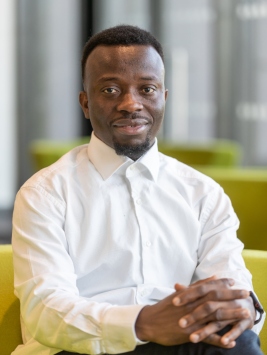
August 16, 2022, by Leah Sharpe
Why a Master’s Was Right for Me
By Noah Ajanaku, Public Health postgraduate student
There are lots of reasons why you may be considering further study. It maybe a requirement of the sector you want to go into, to develop your expertise, or to study a topic you’re passionate about. You’ll need to carefully consider how it could help you achieve your ambitions.
Read on to hear why, Noah chose to undertake further study.
Why I chose to do a masters
After earning my undergraduate medical degree, I had two potential career paths in mind. One choice was to carry on with a more individualised doctor-patient approach to medical practice and then enrol in speciality training. The second career choice was to explore broader perspectives on health needs within the population, especially those affecting vulnerable groups. Due to my early-year work experiences in a conflict-affected region in northeast Nigeria, I chose the latter option.
In this regard, I was fully aware of the inequality in states’ access to basic health needs in addressing livelihood supports, poor hygiene and sanitation, preventable disease outbreaks, and malnutrition. I realised I needed advanced knowledge and skills to address these challenges and position myself for strategic roles with the United Nations organisation. Therefore, a master’s degree in public health was perfect for me. My decision to study at the University of Nottingham was reinforced by its reputation for producing the current Director-General of the World Health Organisation, Dr Tedro, whom I greatly respect. And most importantly, by allowing me to apply and benefit from her 100% Developing Solutions Master’s Scholarships.
What I’m gaining
Master of Public Health (Global Health) programmes at UoN cover issues relevant to real-life situations. On many occasions, it was demanding to have contributed to proposal development back in Nigeria; here on the programme, we have written multiple public health interventions from scratch. My favourite part of this experience was learning about public health interventions and evaluations, health system strengthening approaches, health economic evaluation, and contextual health financing. Also, strategies to improve and protect population health respond to unpredictable outbreaks like Coronavirus or climate change. Our course helped us leverage the strengths of the class diversity in culture, experiences, and race to learn real-life relationship building in public health.
It was through UoN’s job opportunities that I got employed as a Student Engagement Associate. This role allows me to represent student concerns in university activities and contribute to developing concepts and strategies. Finally, I have gained valuable skills that will enable me to be highly competitive in the job market, including critical evidence synthesis and effective communication.
Support from Careers
The Careers and Employability Service at Nottingham is fantastic. Initially, I did not expect my CV to be critically analysed when I scheduled an appointment. The team talked me through how to reduce my ten-page CV down to one and gave tips on what areas to improve. In a follow-up review, I was given tips on how to systematically adapt my CV to various country requirements and apply for my dream job.
Advice to students
All students should be open-minded when choosing their career, have self-trust, and be motivated to learn new skills. While on campus, I highly recommend engaging with the UoN community and exploring available opportunities. It is rewarding to study at UoN for its inclusivity and development and support of employable professionals.
Find out more about your further study options, finding the right course for you and how to apply and secure funding.
No comments yet, fill out a comment to be the first

Leave a Reply